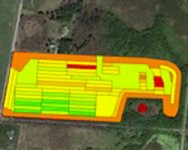Precision Agriculture Series - Steuben County
Event Details
Date
February 6, 2020
March 26, 2020
April 9, 2020
Time
1:00 - 3:00 PM
Location
Steuben County Office Bldg Annex Conference Rooms A-B
20 E Morris St
Bath, NY 14810
Cost
FREE!
Host
Cornell Vegetable ProgramAli Nafchi
585-313-6197
email Ali Nafchi

THIS EVENT HAS BEEN POSTPONED but has not yet been rescheduled. If you have any questions, please contact Ali Nafchi at 585-313-6197.
Join Cornell Cooperative Extension to learn what precision agriculture entails, the economics of using precision ag, and the preferred methodology and benefits. This free, 3-day event series is being organized by CCE Steuben County with assistance from Dr. Ali Nafchi, Precision Ag Specialist of the CCE Cornell Vegetable Program and CCE NWNY Dairy, Livestock, and Field Crops team. Topics for each day will be determined by the audience interests and questions.
Precision Agriculture (Introduction)
- Why should producers be interested in precision agriculture?
- Goals, key factors, information, technology, management
Components of Precision Agriculture Equipment
- Key components, equipment, computer/controllers, sensors, GIS, GPS, remote sensing, satellite imagery, UAV's
Agricultural management philosophy (PA perspective)
- What is zone management?
- Best management practices
- Soil and tillage management
Soil electrical conductivity (EC) and ways to measure it
Precision soil sampling vs. grid sampling
- Soil EC: Veris vs. EM38, EC vs. soil texture, and EC vs. yield map
Site specific management/variable rate applications
- Variable depth tillage control, variable seeding rate, automatic section control, variable rate irrigation, and variable irrigation based on soil texture
Map Principles
- Why is map-making important?
- Yield maps vs. prescription maps
- Importance of yield monitors, yield monitoring components, calibration and factors that effect on it
Introduction to NDVI
- Characteristic of NDVI values
- NDVI estimation and photo analysis
Economics of using precision agriculture Preferred methodology and benefits, evaluation
Topics for each day will be determined by the audience interests and questions.
FREE sessions but registration is required by calling CCE Steuben County at 607-664-2300.

Upcoming Events
Eden Area Winter Vegetable Meeting
February 4, 2026
North Collins, NY
Join us for a mix of industry updates, crop protection talks, pesticide safety programming, and fertility management discussions. This meeting is jointly hosted by the Cornell Vegetable Program and Timac Laing-Gro.
1.25 DEC credits available in CORE plus 1.75 in 1a and 23.
Orleans Regional Winter Vegetable Meeting
February 9, 2026
Albion, NY
Topics include: Breeding and evaluating tomatoes to control disease and improve yield, jar testing and ensuring spray water quality, breaking down organic matter, FSMA updates and Q&A with Ag & Markets, and industry updates. Includes hands-on learning, coffee break, and sponsor booths.
DEC credits available: 1.0 in CORE plus 0.5 in 1a, 10 or 23
African Eggplant Participatory Breeding Kick-Off
March 5, 2026
Join us to learn about the Cornell African Eggplant Research Project and learn how you can participate! African eggplant, also known as Bitterball, Garden Egg, Kittley and other names, is an important crop for many members of our community with heritage from regions such as sub-Saharan Africa, Southeast Asia, and Brazil. Since 2024, the Cornell African Eggplant Research Project has been collaborating with growers and community partners across New York to develop high-quality varieties adapted to the Northeast U.S. In this meeting, we will share information about growing and preparing African eggplant, highlight our research to date, and invite partners to collaborate with us in our 2026 participatory breeding and variety selection efforts.
COST: FREE! You must pre-register to receive the Zoom link.


































